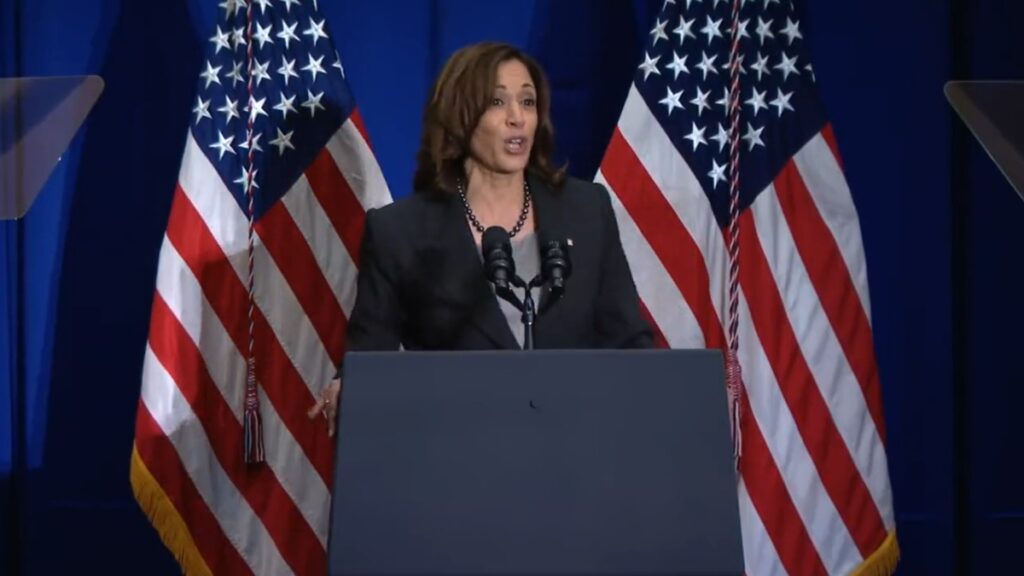Despite the public enthusiasm over Vice President Harris’s rapid ascent to likely become the Democratic presidential nominee, Democratic lawmakers are privately concerned about her chances against former President Trump. They recognize that she remains largely untested as a candidate and faces significant challenges, The Hill reported this week.
The anxiety has largely been overshadowed by a deep sense of relief that President Biden chose not to seek reelection. After months of uncertainty about the 81-year-old incumbent, Democratic lawmakers are now eager to support Harris, hoping she can energize Democratic donors, as well as young and minority voters. But concerns are already surfacing about Harris’s ability to connect with the white working-class and union voters in the key states of Michigan, Pennsylvania, and Wisconsin—states that were crucial for defeating Trump in 2020, said the outlet.
“She wasn’t a great candidate,” one Democratic senator said of Harris’s performance as a presidential candidate in 2020, when she pulled out of Democratic primary before the Iowa caucuses. “And she may not be as a political campaigner as good as Biden was in his prime,” the senator added. The lawmaker suggested that Harris’s political skills may be less critical to her success now that nearly the entire Democratic Party is uniting behind her. With a clear path to the nomination and the Democratic National Committee’s virtual proceedings scheduled for early next month, her political acumen might be less of a focus, The Hill noted.
“She’s not campaigning in a primary. She is the candidate, she’s got thousands of people working for her, and she’s got a team of the smartest people, many of whom have worked with her over the years,” the senator said, going on to warn that her path to the White House won’t be an easy one. “We need to be very clear-eyed, and it’s going to be brutally tough,” the lawmaker said.
The Hill added:
An Emerson College poll of registered voters in swing states conducted July 22-23 found Trump leading Harris 46 percent to 45 percent in Michigan, and 48 percent to 46 percent in Pennsylvania, while the two candidates tied at 47 percent in Wisconsin.
Sen. Bernie Sanders (I-Vt.) and his allies say Harris needs to do a lot more to win over blue-collar voters in these states. They weren’t happy that Biden got shoved off the ticket after working closely with his top advisers to craft a progressive economic plan for the first 100 days of his second term.
“For her to become president, she’s going to have to be talking about issues that impact the 60 percent of Americans, working people who are living paycheck to paycheck,” Sanders told The Hill last week. A Democratic strategist aligned with Sanders questioned whether Harris would be a stronger candidate than Biden in November. The source pointed out that during her three and a half years as vice president, she was more closely associated with defending abortion rights and voting rights than addressing economic inequality.
A major concern for Democrats is that third-party candidate Robert F. Kennedy Jr. might draw votes from culturally conservative, union-aligned working-class voters in the industrial Midwest. A second Democratic senator, who spoke on condition of anonymity, admitted that Harris isn’t perfect but argued that she is a better choice than Biden. The senator pointed to widespread pessimism about Biden’s chances of winning following his poor debate performance and unsuccessful efforts to stabilize his campaign.
“Democrats were in a depression,” the senator said of the mood in the caucus after the debate. “Behind the scenes … almost everyone was pushing hard to say, ‘Gosh Joe, we love you, but go.’ It’s not as if there was a perfect vision of, ‘Oh we have the best candidate in the world [in reserve],’” the senator added. However, the source noted that Harris has limited time to win over voters in Michigan, Pennsylvania, and Wisconsin—the three most critical states for securing the White House.
A Democratic strategist based in Pennsylvania pointed out that Harris lacks a special connection to the Keystone State, unlike Biden, who was born in Scranton and served neighboring Delaware in the Senate for 36 years, The Hill noted. “What I find surprising is how few relationships she has here,” the strategist said. “California is very far away. It’s seen as very foreign, culturally. Everything I’ve always heard is she doesn’t have that many relationships in Pennsylvania, and she hasn’t established any kind of identity here,” the source said. “Obviously, it’s a very big difference with Joe Biden.”



